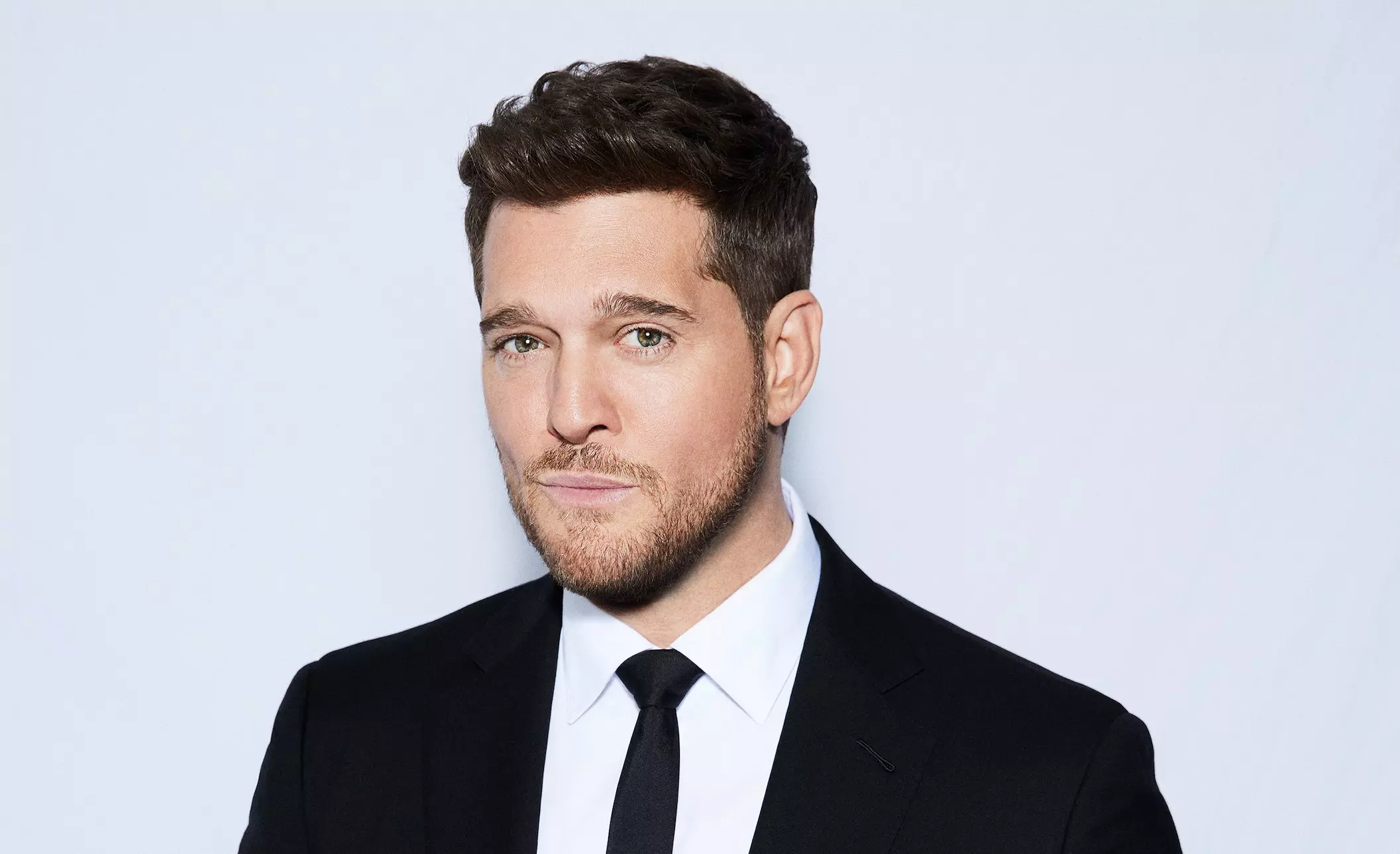Photo: Danielle Ernst
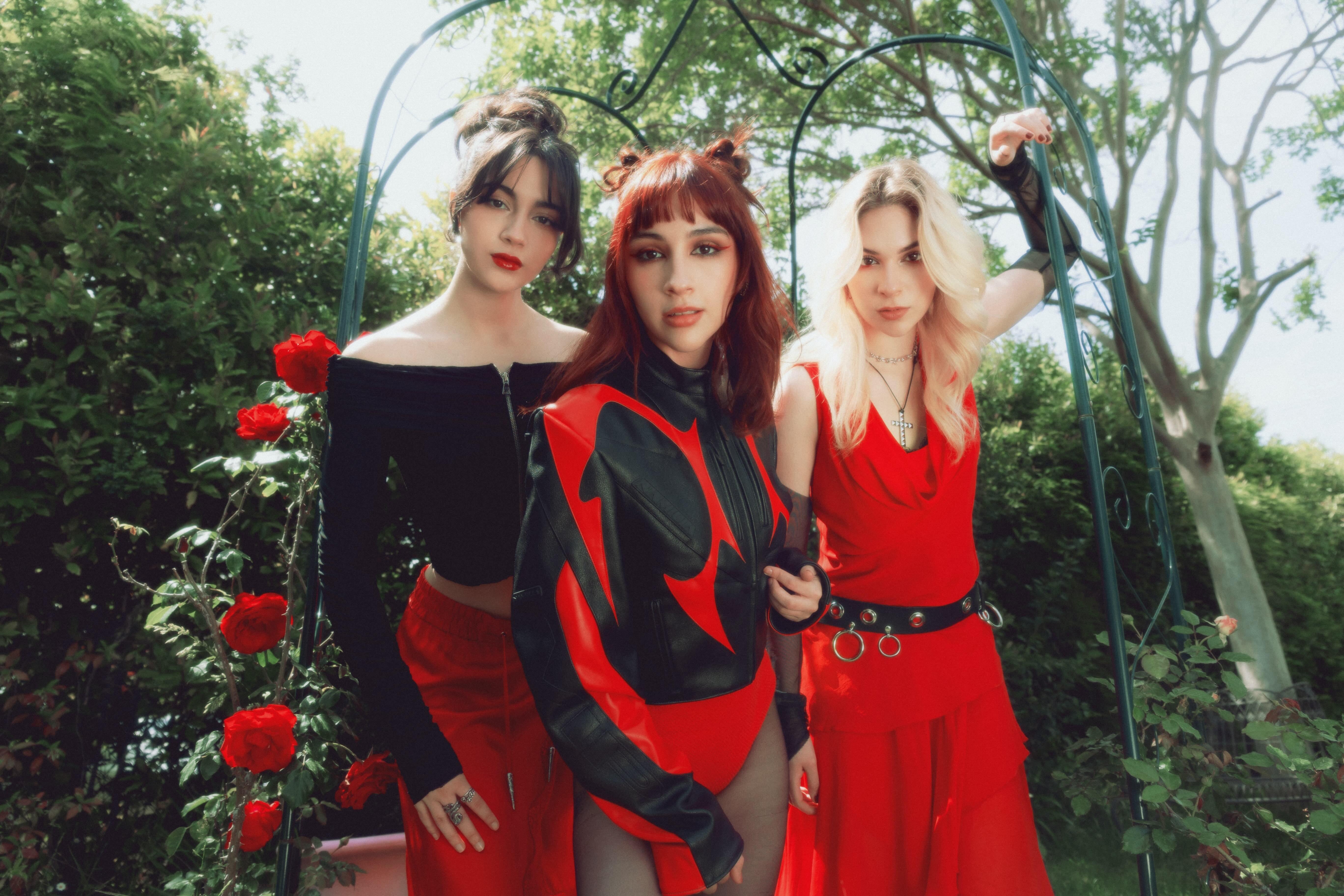
interview
Mexican Rockers The Warning On 'Keep Me Fed' & "The Possibility That We Could Literally Do Everything"
The three sisters of the whiplashing Mexican rock band The Warning sat down with GRAMMY.com to talk about their biggest recorded leap to date, 'Keep Me Fed.'
The Warning have been around for over a decade, with three previous albums under their belt — but they've never hit with gale force quite like their single "S!CK." Get a load of them on a recent "Kimmel" performance below; when singer/guitarist Daniela "Dany" Villarreal Vélez screams the title, her bandmates — her sisters, bassist Alejandra "Ale" Villarreal and drummer Paulina "Pau" Villarreal — respond with a groovy, steamrolling riff.
From harmonies to songwriting to sheer charisma, The Warning have reached a new pinnacle with their fourth album, Keep Me Fed, which arrived June 28. It's packed with bangers: the boiling-over "Apologize," the chugging, Spanish-language "Qué Más Quieres," and pop-laced detours that stick, like "Hell You Call a Dream."
The Monterrey, Mexico trio have opened for some of rock's titans over the past few years: Guns N' Roses, Foo Fighters, and Muse. This only incentivized them to make Keep Me Fed hit as hard as humanly possible.
This involved reaching out to rock's blue-chip writers, like Dan Lancaster and Mike Elizondo, to help the songs truly hit the jackpot. But speaking to the three on a four-way call, it's clear their success really relies on their sisterly synergy: they effortlessly bounce off each other in conversation, just like they do in the studio or on a stage.
Read on for a full interview with The Warning about the road to Keep Me Fed, songwriting in Spanish and English, and how supporting the greats spurred them to make a swing that connected.
This interview has been edited for clarity.
**Bring us from the Error era to Keep Me Fed. What transpired in The Warning's history?**
Pau: We grew so much as people, through our experiences touring with Foo Fighters, Muse and Guns N' Roses. You can't help but learn and grow from all of these experiences and shows.
We were very inspired, and I feel like Keep Me Fed was the first opportunity we had to sit down and actually process everything that we had been through, and just put it directly into the music.
Ale: We were recording and writing in between tours; we had a hectic schedule. I feel like you can definitely hear that chaotic energy, and everything we lived through this past year while writing the album.
You opened for some of the biggest rock bands on the planet. Tell me more about how that fed into the music.
Pau: Seeing these amazing musicians playing every night, you can't help but want to push yourself. What made us grow was that hunger to be better. We wanted to be a good opener for these legendary bands. We wanted the crowd to be impressed; we wanted to prove ourselves to these new crowds.
And, not only with our live performances: we knew we were going to write this album, and release new music. And if these new people were going to look for our new music, we wanted it to be this insanely huge step forward in our careers.
Musically, our biggest references are Muse and Royal Blood — and we toured with them. So, by seeing what they do live, and how their ideas are [executed], we had a really good idea of how we wanted our ideas to sound live.
Dany: Coming home from the tours to process everything that you went through, I think unconsciously you let everything out, and let everything go when you're writing music. I think that played a big part in what we came back to express in the Keep Me Fed songs.
Can you talk about working with outside writers on Keep Me Fed?
Ale: We've always only worked within the few of us, so adding someone else to the mix was very different. It's so interesting to see how other people work, and working with them, and hearing all of these different ideas. I feel like we learned so much from every person we wrote with.
Dany: We have three songs with Dan Lancaster, who is touring with Muse now; he's a great producer as well. We worked alongside our producer, Anton DeLost, for the whole record. They are such a dream team, honestly. They knew how to push us toward a direction that made us get the best out of us.
We were so surprised by the stuff we lived through — very intense, specific feelings, that they can relate to in a totally different way. We managed to connect the dots between feelings and what we wanted to express.
Pau: Also, they're not necessarily rock writers. Some of them are pop. Some of them are R&B writers. It's a really big melting pot of styles and inspirations and experiences.
You start learning little tricks and tips from each person. So now, even when we're writing alone, we channel everything that we learned from these individual writing sessions.
And I feel like we look at songwriting in a new way — especially because we are Mexican, and English is not our first language. So, we write in English with a very different mindset; we think in Spanish while we are writing in English. We see language in a more phonetic way.
So, finding new ways to look at the language that we write in, and new ways to communicate what we want to say through the words or eyes of these other writers, was a very enlightening experience.
The Warning - Qué Más Quieres (Official Video)
Keep Me Fed sounds absolutely massive. How did you craft that sound?
Dany: We were very focused on making it sound as big as possible, and as close to our live performance energy as we could. Guitar-wise, we explored a lot of different fuzz pedals, which was very new to me. I wasn't very much of a fuzz girl, but oh my god, it adds so much texture, and it added to the sound that we wanted to hear.
Also, we went a lot heavier with this album. I experimented with playing with baritone guitars, so I could be a lot lower than I usually am. I love that; it makes me feel so powerful, and I think it adds a lot to the songs.
Ale: I recorded all my bass parts with a pick, which is something I don't do; I only play with my fingers. But for the recording, it sounded clearer, and made the bass stand out, as we're only a three-piece. So, I liked exploring that.
Dany: I learned to play with a slide. I had never done that before. And I had to figure out how to play it live down the road. It really pushed us, and me, to stay sharp and do what was necessary for what we wanted to express in the music.
Vocally, I experimented with a lot of different textures. We usually just go all out and do this angry screaming that I know how to do from our 10-year career. But this time, I [explored] the dynamics more and more. I went soft, I went a little more airy, and then I screamed. It was fun to get to know myself more as a singer and guitar player.
Pau: We explored a lot of different styles. You can hear different [unexpected] influences. "Burnout" is really funky and groove-driven. "Apologize" is just a very angry song. "Sharks" is this type of new thing. It's just so varied.
We let ourselves be open to the possibility that we could literally do everything. We could try everything out, and it would still fit in this album, because it was still us.
Explore The World Of Rock

How Gwen Stefani's New Album 'Bouquet' Celebrates A Career Built On Love In All Its Forms
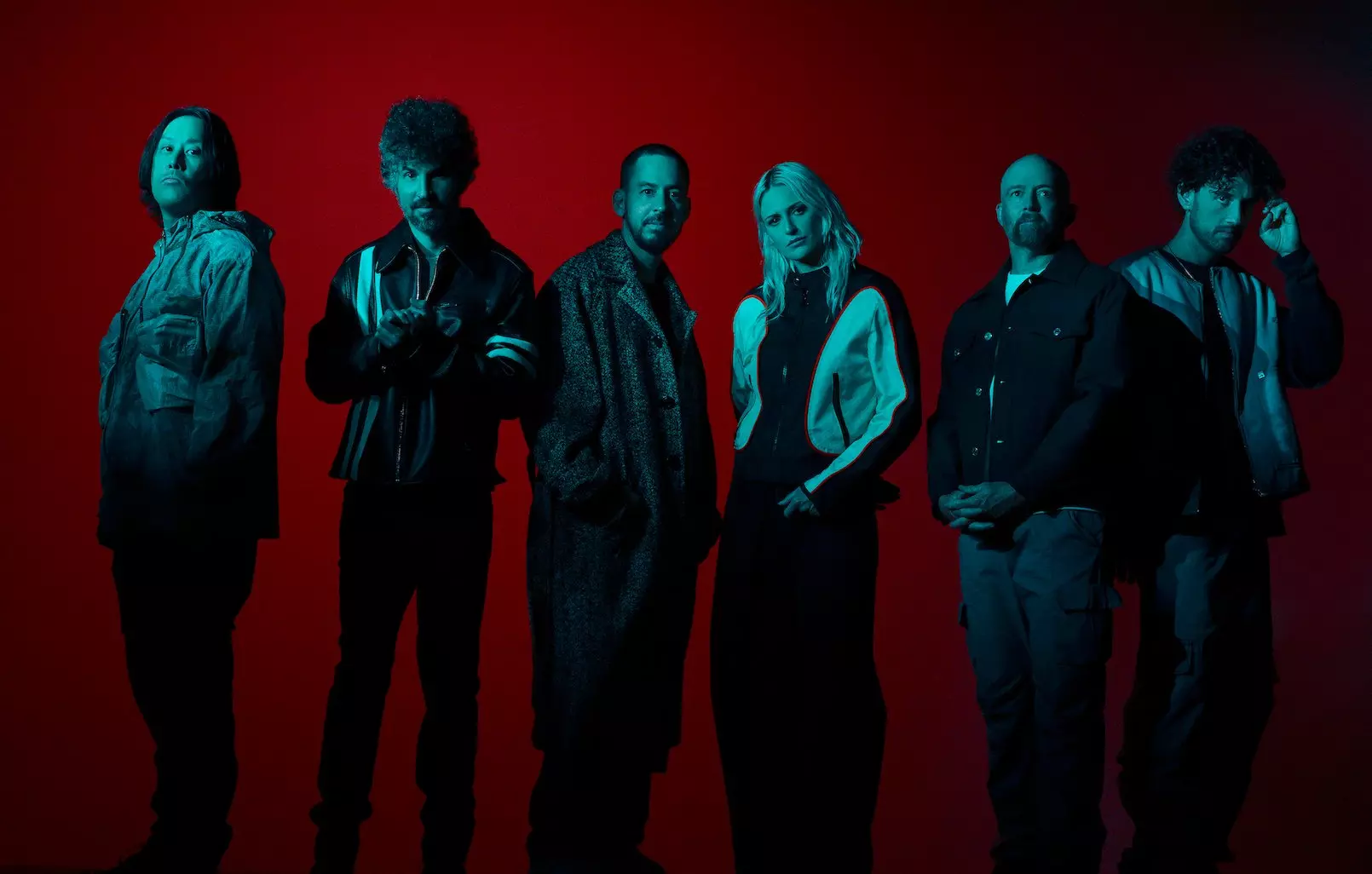
How Linkin Park's New Album Honors Chester Bennington
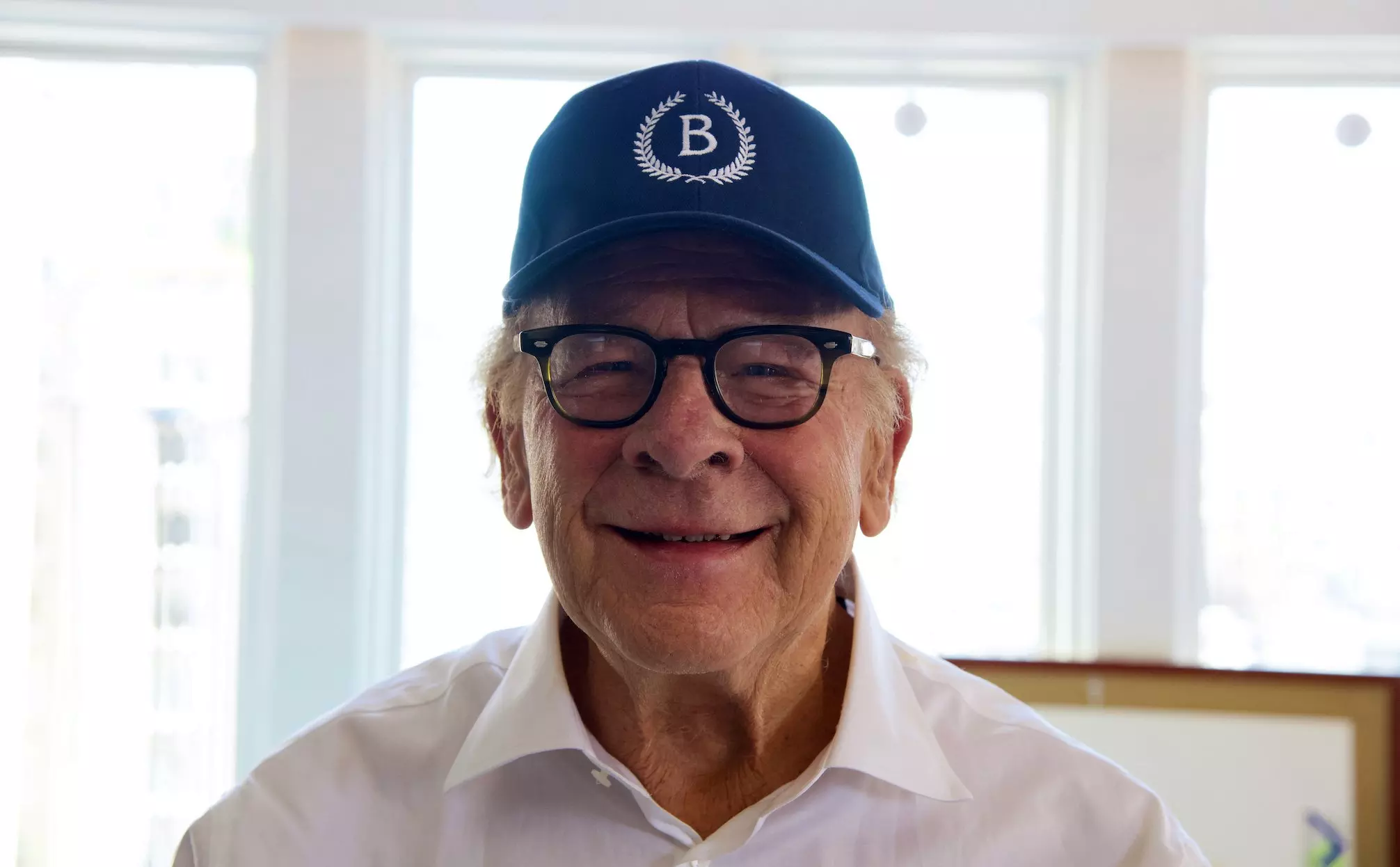
Living Legends: Art Garfunkel On New Album 'Father And Son,' Following His Muse & "The Greatest Thrill Of My Performing Life"

Radiohead Performs "15 Step" At The 2009 GRAMMYs

14 Must-Hear Albums In November: The Cure, Dolly Parton, Jin Of BTS, Ab-Soul, & More

Photo: Denise Truscello/Getty Images for iHeartRadio
feature
How Gwen Stefani's New Album 'Bouquet' Celebrates A Career Built On Love In All Its Forms
As the pop veteran releases her first album in seven years, look back on the journey of romance, heartbreak and self-acceptance that led to her blooming marriage to Blake Shelton — and her happiest album yet.
Long before it became a viral TikTok trend, Gwen Stefani's pouty declaration of "I'm just a girl" on No Doubt's 1995 breakthrough single was simply an honest affirmation. She wailed about the frustrating tug of war between empowerment and vulnerability that came with womanhood — and she's been wearing her heart on her sleeve just the same ever since.
The three-time GRAMMY winner first made herself known as the quirky frontwoman of No Doubt, taking the reins of the male-dominated rock world before venturing into solo pop stardom and building her own brand along the way. But no matter her level of stardom, Stefani has never shied away from displaying her private life.
Love and music are a pairing just as tight-knit as Stefani's signature platinum locks and crimson lips. She has sung about the ebbs and flows of romance since the beginning of her career, from the pained realization of a relationship's end on "Don't Speak" (from No Doubt's 1995 album, Tragic Kingdom), to yearning for a "simple kind of life" on the band's 2000 LP, Return To Saturn, to navigating a divorce on her 2016 solo album, This Is What the Truth Feels Like. Her latest set, though, is blooming with a healthy love.
Bouquet, Stefani's fifth solo album and first in seven years, is heavily centered around her past, present and future with husband Blake Shelton. While the country star seems like the complete opposite match for a ska princess — who met Shelton while both were coaches on NBC's "The Voice" in 2014, and they've been married since 2021 — Stefani attributes the positive shift in her music to meeting him.
"For me, what happened in the breakup of my family, I had to try to pick up the pieces. Out of that was new love. Not only new love, but real love," Stefani tells GRAMMY.com on how her confidence blossomed over the years. "I don't feel like I ever experienced that until I felt what it really felt like to be loved. When someone loves you in a pure way, it does make you feel like you can see inside of yourself what they're seeing for the first time.
"Love is hard to explain, but there's something spiritual about it. I feel like we're all constantly blooming and re-blooming," she continues. "We are growing and evolving, and out of pain, usually you find things inside of yourself that you didn't know you had. Being able to have an outlet like songwriting to be able to learn from yourself is an incredible blessing that I have been given."
"We can watch our garden grow," Stefani croons on album cut "Reminders." While the line refers to Shelton, it's a fitting sentiment for the year she's had. Bouquet arrives just three days after the 20th anniversary of her GRAMMY-nominated debut solo album, Love.Angel.Music.Baby, and seven months after the singer reunited with No Doubt at Coachella — their first performance together in nine years.
As "Reminders" displays, Stefani blissfully sings about finally finding peace and hope on Bouquet. Though it's her most upbeat celebration of love to date, it's also a culmination of the journey she's endured navigating it in all its forms — from very public breakups, to motherhood, to spirituality and finally finding true love.
Stefani's career began as the lead vocalist of No Doubt in 1986. Following a breakup with band member Tony Kanal, she used the band's breakout third album — 1995's Tragic Kingdom — as her personal diary. The singer co-wrote all but one song, and the rawness of the lyrics shot Tragic Kingdom to No. 1 on the Billboard 200 chart. Stefani continued to weave in her love life in the music, from wanting to be a wife on 2000's Return of Saturn and struggling with a long-distance relationship on 2001's Rock Steady.
Her growing confidence as the band's co-writer led to her solo debut album, 2004's Love. Angel. Music. Baby. The album was a complete departure from No Doubt, as Stefani experimented with glossy '80s electro-pop, new wave, hip-hop, R&B, and even spoken word. While the first three singles presented more of her confident, commanding frontwoman side — including the Billboard Hot 100-topping smash "Hollaback Girl" — and the album featured themes of money and partying at the club, love remained at the forefront.
"Born to blossom, bloom to perish/ Your moment will run out 'cause of your sex chromosome," she reminds herself about wanting to be a mom on lead single "What You Waiting For?" On "Cool", she accepts her friendship with No Doubt's Kanal after healing from their breakup. Album cuts "The Real Thing" and "Serious" best show off Stefani's romantic side; the latter served as a love letter to her then-husband, Bush frontman Gavin Rossdale, and "Serious" declared in the first verse, "Call the doctor cause I am sick in love/ And I can't help it."
"There was so much freedom in my own heart and soul," Stefani says of her early solo days. "I had such a clear direction and I felt like I couldn't be stopped. The ideas and clarity on the art that I was creating was so easy to access. There was something so pure about this."
L.A.M.B. achieved massive success, debuting at No. 7 on the Billboard 200 chart and earning six GRAMMY nominations, including one for Album Of The Year. The album's success is attributed to not only Stefani stepping out of her sonic comfort zone, but her maintaining the same authenticity she brought to No Doubt's music.
"People know when something is authentic and something is not trying to do anything but just be – maybe that's why [it resonated]," she says. "It was simply going to be my fun, dance, guilty pleasure album and me trying to recreate things that inspired me from high school. I feel super grateful to reach anyone with the music that I've created."
By the time she delivered 2006's The Sweet Escape, Stefani had experienced big life changes, Along with becoming a first-time mom, she was dealing with marital issues, which she alludes to throughout the album — and, ultimately, led to a more melancholy feel than its predecessor.
On the title track, she envisions a fantasy to avoid real-life problems ("I can see that you're angry by the way that you treat me/ Hopefully you don't leave me, wanna take you with me"), and tries to hold on to her relationship on the "4 In The Morning" ("All I wanted was to know I'm safe/ Don't wanna lose the love I've found"). While the album may not express a happy love, it uncovered a deeper side of her vulnerability.
Within the decade after The Sweet Escape, Stefani took some time away from music as she focused on motherhood (she had another son in 2008). She reunited with No Doubt on 2012's Push and Shove, their first album in 11 years, which refueled Stefani to work on her third solo album. But it would still be four years until a full album materialized, as 2014 marked both the birth of her third son and her first season on "The Voice." A year later, Stefani endured a major life change: divorcing Rossdale, after discovering his alleged infidelity.
The heartbreaking revelation led to 2016's This Is What the Truth Feels Like. The super-confessional album revealed Stefani's healing process following her divorce (the tearful "Used To Love You" and the scornful "Red Flag"), but it was balanced by her new love with Shelton after meeting on "The Voice." From the bubbly "Make Me Like You" ("Thank god that I found you," she sings) to the yearning on "Misery" ("I'm thinking things I never thought before/ Like what your love would taste like/ Give me more," she pleads) to the flirtatious "Send Me A Picture," Stefani was shamelessly reveling in newfound happiness.
"I look back at each album that I've been part of and think about how they came about and what the inspiration was; and what I was going through at the time," Stefani says. "This Is What The Truth Feels Like was a unique album because this was the worst time of my life and the only thing I could turn to was God, prayer, my family, and music. It was the only way I knew how to save myself. I started writing that record so I wouldn't go crazy.
"I made the album quickly, in about eight weeks. About halfway through writing it I had this gift of love that was right there. I didn't know it was going to be there and I got to write about that," she continues. "It was an expression of two things happening at one time — something ending and something bringing me back to life. I wasn't thinking too much about the production on this album, it was more me trying to get out lyrically what I needed to get out."
Following This Is What the Truth Feels Like, Stefani's aura felt lighter and more self-assured as she reclaimed her confidence as both an artist and a woman.
This shift was mainly attributed to her adoration for Shelton, which thus inspired her music after that. He was featured on the title track of Stefani's bubbly holiday set, 2017's You Make It Feel Like Christmas, and they released two country duets in 2020, "Nobody But You" and "Happy Anywhere." Though the singles were Stefani's first foray into the genre, her chemistry with Shelton resonated: both went to No. 1 on Billboard's Country Airplay chart.
Stefani also dabbled in ska again with 2020's "Let Me Reintroduce Myself" and 2023's "True Babe," but even she admits that wasn't the right direction ("I was circling the past and I kept going around these cul-de-sacs," she says). So she stuck to her instincts: recording blissful tunes that emulated her life.
The winding roads of Stefani's career — and love life — have now led to 2024's Bouquet, which she deems a "whole different energy." But while the cover features Stefani rocking a cowboy hat and the album was recorded in Nashville with famed country producer Scott Hendricks, it's far from a country album. Rather, the 10-track project is a wistful blend of '70s-inspired pop and yacht rock that reflects the joy Stefani feels.
"I got engaged and married, so writing this album was writing about this new part of my life. When I finished doing the songs, I felt uncomfortable about the production — not because I didn't love it, because I did, but it just felt like I was repeating myself," she says. "It felt like when you go back into the closet and find something old from high school and try to put it on and think it's going to look good and it's just not working anymore. I didn't want to try to compete with the past at all.
"In my mind, it was clear — I needed to go in and make the record have no genre and make the sound creative with live musicians and make it feel live," she adds. "The combination of the pop songwriting and the organic live band is what created the sound of Bouquet, [which] sounds unique from anything else I've done."
The album documents Stefani's eight-year transition following the weighty This Is What The Truth Feels Like. Lead single "Somebody Else's," also the album's opening track, summates the healing she's done in order to unlock this new life chapter. "Everyday with you is rock bottom/ Leavin' you saved me, my God/ Look at me blossom/ You're somebody else's problem," she says with a wink on the chorus.
From there, Stefani leaves that past behind as she gushes about being so deep in love and not wanting to mess it up. The ballad "Swallow My Tears" discusses how an old relationship can impact a new one. "The past keeps chasin' me around/ I thought I lost it but then it found me/ Like it always does/ Dragging me back to who I was," she reflects. "Give me a second I need to swallow my tears."
The ballad is one of the singer's most honest songs to date. As a result, she says recording it felt like an emotional release: "I've been learning through my spiritual faith journey that it's about growing, learning, evolving, getting better and trying to become the person that you're meant to be in the world."
Part of Stefani's journey is rooted in reassurance, which ties "Purple Irises," her breezy country-pop duet with Shelton, together. One of the first songs written for the record, it adds another chapter to her fairytale life with Shelton. "I got you, and you got me/ And do you still think I'm pretty? And are you happy?" Stefani ponders even after years deep into her marriage.
She uses flowers as a metaphor for their relationship throughout the entire album, with the most autobiographical moment being the title track. "We met when my heart was broken/ Thank God that yours was too/ So lucky that you were going through what I was going through," she reflects on the opening verse. (Shelton was also going through a very public divorce from Miranda Lambert as their relationship started to, well, blossom.)
Stefani continues to bare her soul, confront her insecurities on "Pretty" ("I never felt pretty 'til you loved me/ I always felt pretty unlucky") and showcasing her appreciation for finally finding a healthy relationship on "Empty Vase." "Why did it take so much time?/ You've always been the one I've been trying to find/ I know you'll raise my sons right," she tearfully sings atop tender acoustic strings. And for No Doubt fans nostalgic for Stefani's pre-mainstream punk days, Bouquet's rocking "Late To Bloom" shows the singer hasn't forgotten her roots.
The singer's artistry is kaleidoscopic, from being a ska princess to pop's Hollaback Girl to a chart-topping country duet partner. But Bouquet is a reminder of what has always made her music so enduring, and what still resonates after three-plus decades: her vulnerability.
"I think we all go through points in our life when we question, 'What is my purpose?' When I found out I could write songs, and those songs had the impact they had, it was clear this might be my gift," Stefani explains. "I get so much joy and satisfaction. I feel like I have something to offer to the world when I'm writing songs.
"It's the most incredible thing to have a song that captures a moment in my life that talks back to you, heals you, and you learn from it," she adds. "The hope is that someone else can get that same blessing from the song. The struggle is worth it."
The Latest Pop Music News & Releases

Photo: Jason Koerner/Getty Images
news
Watch: The Warning Bring Hard Rock Power To The 2024 Latin GRAMMYs With "Qué Más Quieres"
The Mexican trio capped off a banner year with their first performance at the 2024 Latin GRAMMYs.
The Warning have four albums in their discography, but the sibling trio's latest LP, Keep Me Fed, helped them earn their first Latin GRAMMY nomination. And to celebrate, the three sisters from Monterrey, Mexico, delivered a charged-up performance of their Best Rock Song-nominated track "Qué Más Quieres."
Following a warm introduction from rock legend Juanes, Daniela, Paulina and Alejandra Villarreal Vélez turned the full-force of their rock firepower on the audience with the Spanish-language power ballad, making for an exhilarating Latin GRAMMYs debut.
The trio sing in English more often than Spanish, but performing this single allowed them to show off just how expressive they can be in their first language. It was an incendiary moment in a night already packed with unforgettable performances.
Keep Me Fed marked a watershed moment in the band's career. Along with spawning their first Latin GRAMMY nomination, it was their first album to appear on multiple charts internationally, even rising to No. 1 on the UK Rock & Metal Albums Chart.
Check out the complete list of winners and nominees at the 2024 Latin GRAMMYs.
Latest In Latin Music, News & Videos
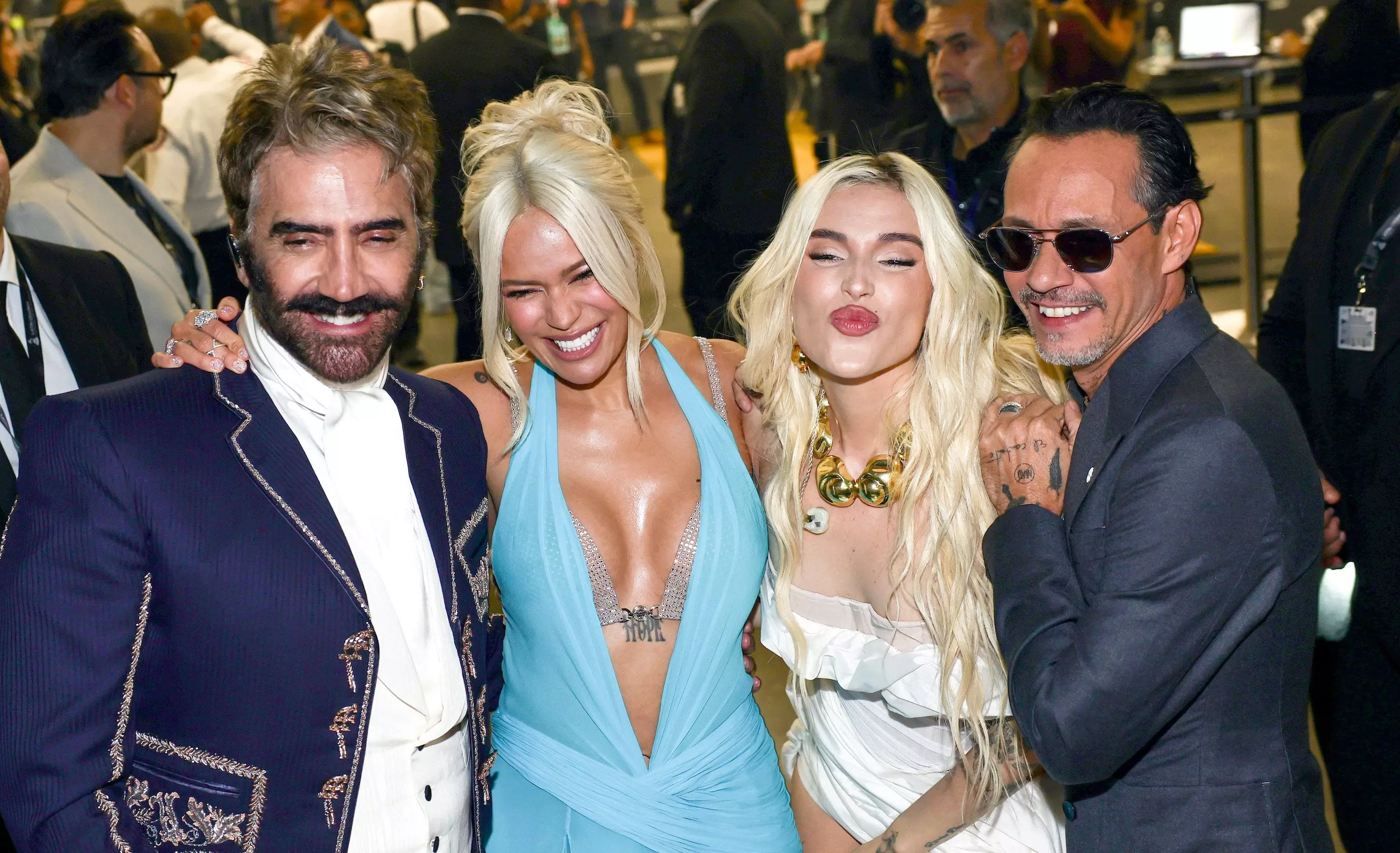
10 Meaningful Moments From The 2024 Latin GRAMMYs: Karol G's Heartfelt Speech, Tributes To Late Legends & More
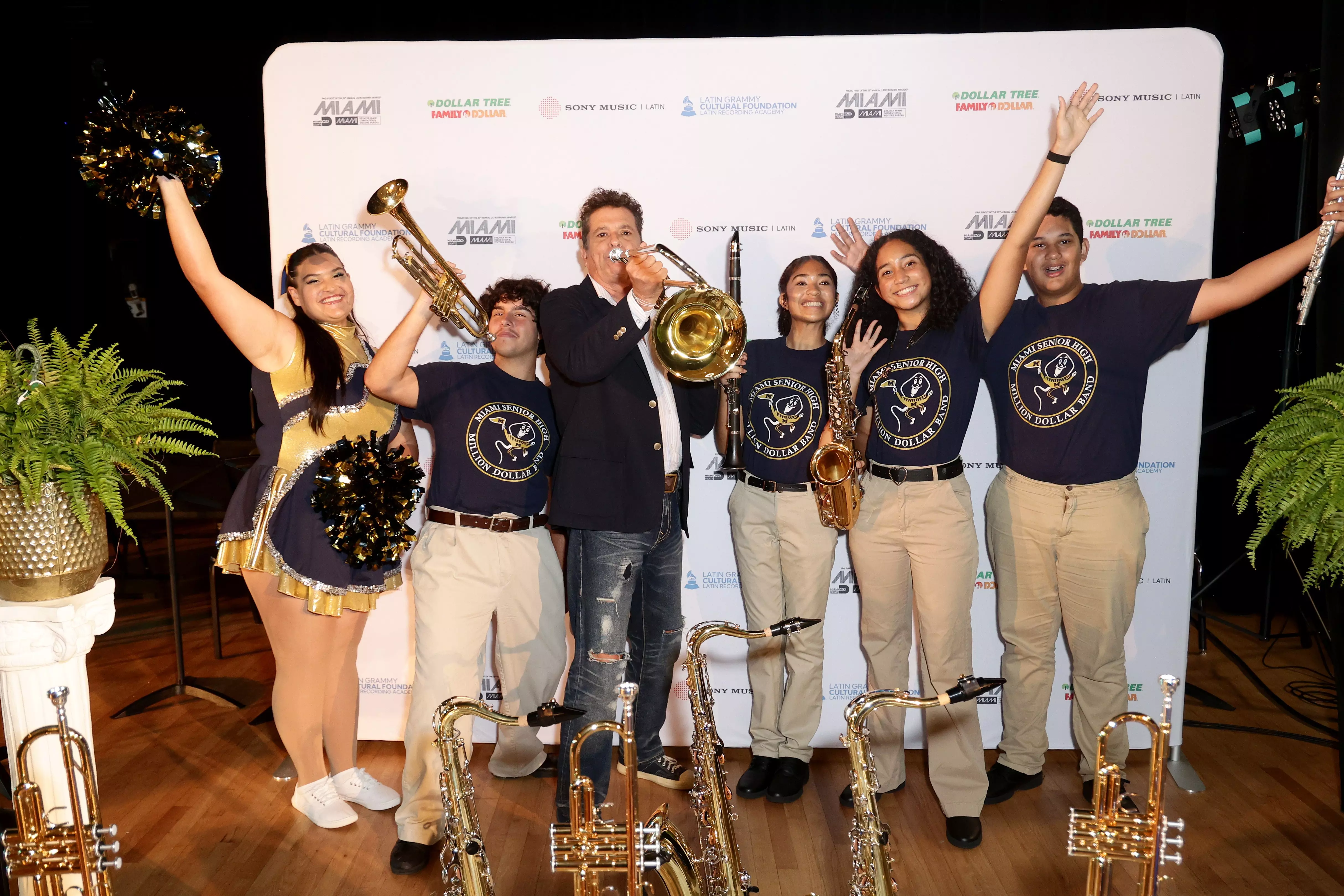
Behind The Scenes At Latin GRAMMY Week 2024: Inside VIP Celebrations & More
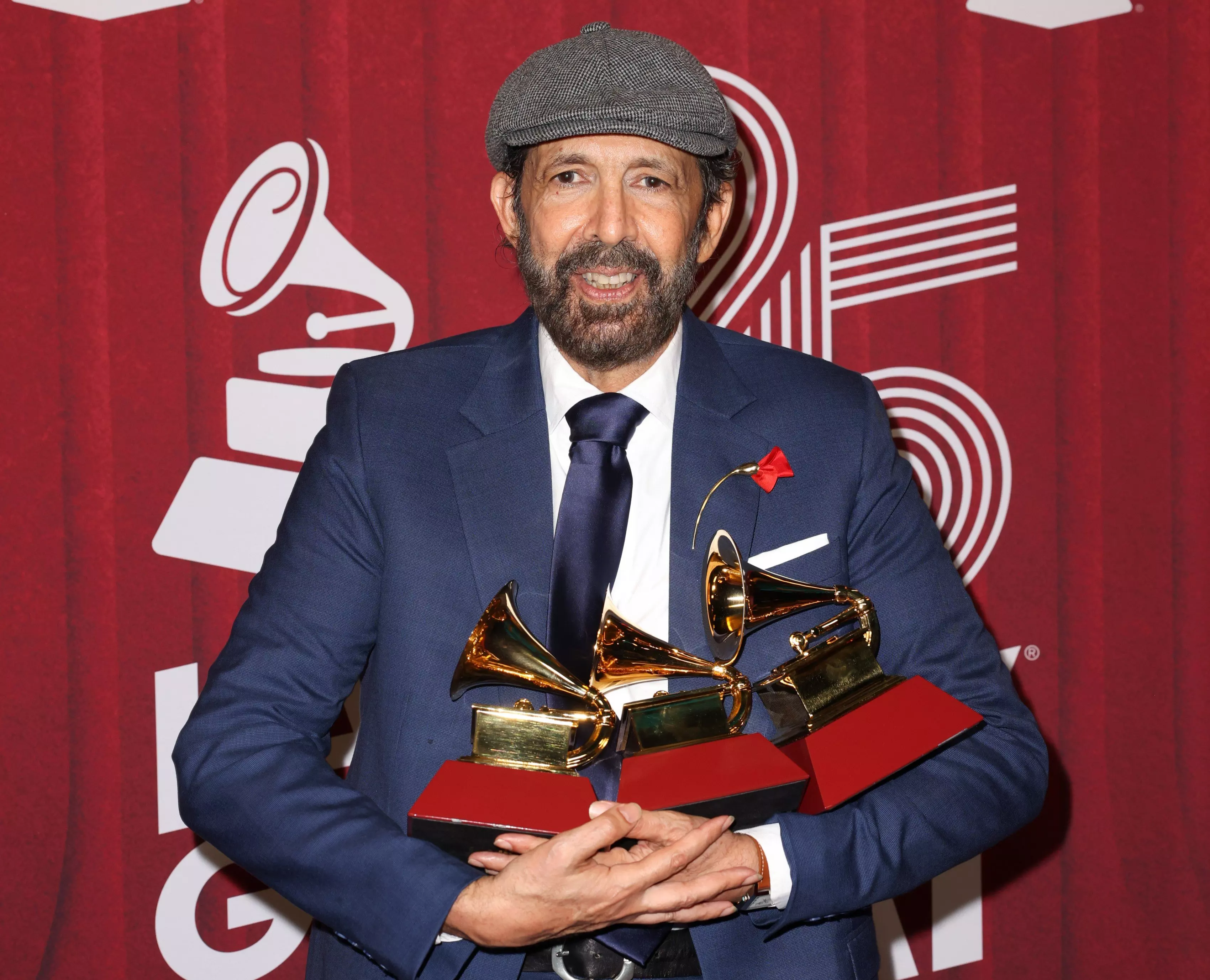
Juan Luis Guerra Sweeps The 2024 Latin GRAMMYs With 'Radio Güira'

Watch: Luis Fonsi Performs "Despacito" & Two More Of His Classics At The 2024 Latin GRAMMYs

Watch: Juan Luis Guerra 4.40 Wins Album Of The Year For 'Radio Güira' | 2024 Latin GRAMMYs
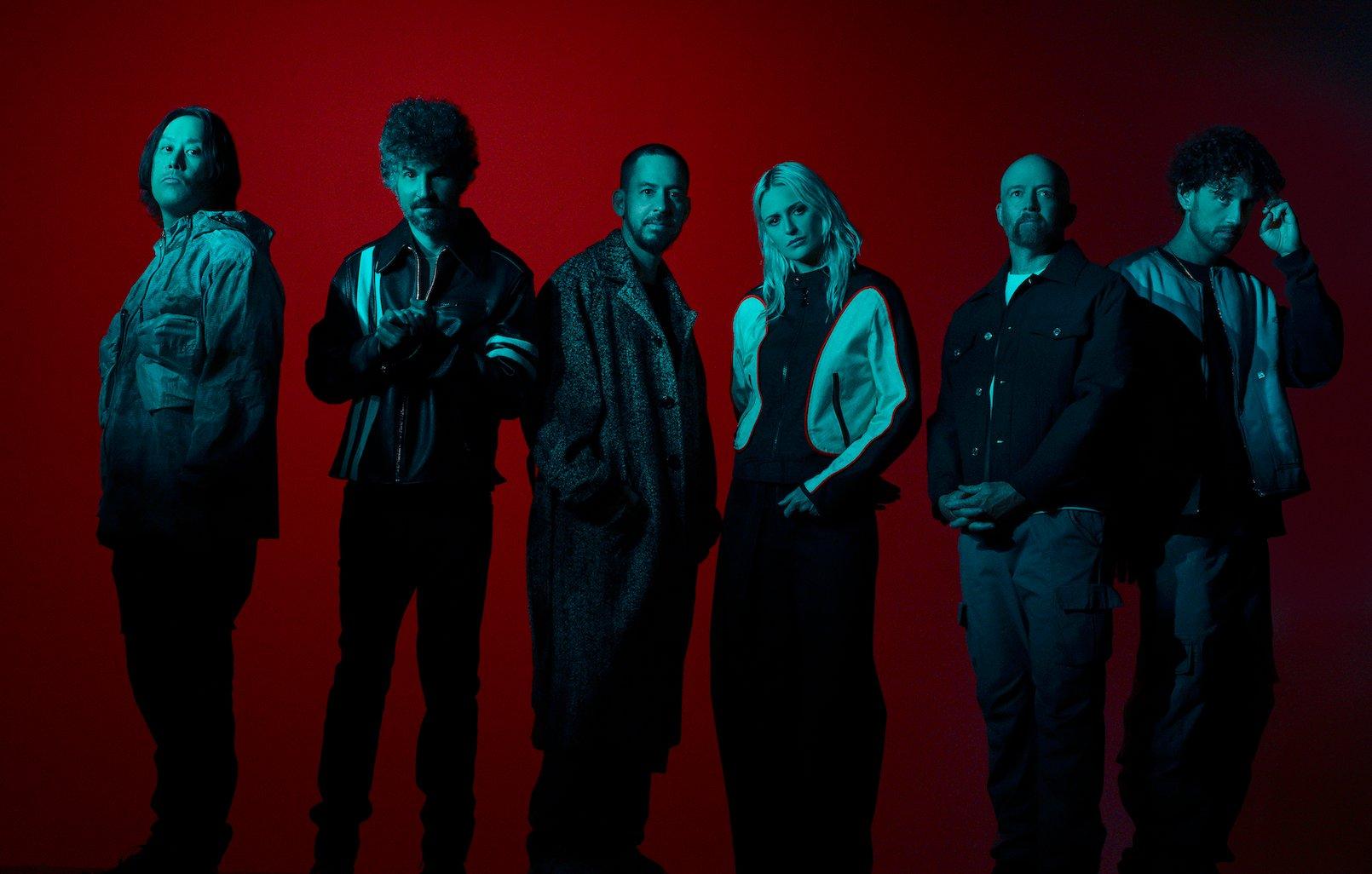
Photo: James Minchin
feature
How Linkin Park's New Album Honors Chester Bennington
With 'From Zero,' Linkin Park ushers in a new chapter featuring a female singer. But as the music and the band ensure, it's simply a continuation of the legacy that the late Chester Bennington helped build.
Linkin Park became ubiquitous with their 2000 debut LP, Hybrid Theory, and reinforced their status as the 21st century's definitive nu-metal band with each album thereafter. But it's been seven years since Linkin Park released new music, priming a new generation to discover their one-of-one impact — including Mike Shinoda's daughter.
In September, the band's co-lead vocalist and producer told Jimmy Fallon about a recent instance when his daughter rejected his attempt to teach her how to play guitar. As he recalled, it wasn't until his wife, Anna, intervened and told her she should listen to him: "My daughter goes, 'What does he know about performing?'"
Shinoda's daughter — along with 11 million other viewers — were reminded of Linkin Park's instinctive magnetism during the Linkin Park: FROM ZERO global livestream in early September. The performance coincided with the announcement of From Zero, the band's first LP since frontman Chester Bennington died by suicide on July 20, 2017, as well as the introduction to a new lineup.
Shinoda, lead guitarist Brad Delson, DJ/turntablist Joe Hahn, and bassist David "Phoenix" Farrell reconnected with the innocent, pure creativity that catapulted Linkin Park in the first place. But adding Dead Sara's Emily Armstrong as the new co-lead vocalist and Colin Brittain in place of Rob Bourdon on drums crystallized From Zero, due Nov. 15, and served as the latest iteration of a legacy built on reinvention.
"Before Linkin Park, our first band name was Xero," Shinoda said in a From Zero press release statement. "This album title refers to both this humble beginning and the journey we're currently undertaking. Sonically and emotionally, it is about past, present, and future — embracing our signature sound but new and full of life. It was made with a deep appreciation for our new and longtime bandmates, our friends, our family, and our fans. We are proud of what Linkin Park has become over the years and excited about the journey ahead."
The first taste of From Zero was "The Emptiness Machine," an explosive, guitar-laden track that possesses similarly heightened lyrics and experimental sonics to Linkin Park's past material. Within two weeks of its release, "The Emptiness Machine" hit No. 1 on Billboard's Hot Hard Rock Songs chart, where it remains after nine weeks as of press time. With a six-week run atop the Mainstream Rock Airplay chart as well, the song's success showed that there was still an unwavering attachment to Linkin Park, no matter the lineup.
Several comments on the video for "The Emptiness Machine" further proved that. "No, she doesn't sound like Chester. But she sure sounds like Linkin Park," one fan wrote. As another added, "Emily roars like a lion and it's amazing that I feel like I can feel Chester roaring in the background. Thank you for coming back."
Naturally, there were some skeptics of the new iteration, including Bennington's mother, Susan Eubanks, and his son, Jaime (Eubanks told Rolling Stone that she feels "betrayed"; on social media, Jaime accused Shinoda of "quietly erasing my father's life and legacy in real time"). But as Shinoda reassured fans at a recent performance, "It is not about erasing the past. It is about starting this new chapter into the future and coming out here for each and every one of you."
Fans can also rest assured that Armstrong wants to honor Bennington, not replace him. In fact, Bennington was who helped Armstrong realize her potential as a frontwoman.
"I was in a band when [Hybrid Theory] came out," Armstrong recalled to Billboard. "'One Step Closer' was the song for me, and I was just like, 'Holy s—, that's what I want to do. As a singer, I want to be able to scream.' That album was everything. I've listened to it a trillion times."
When it comes to the importance of her role, she added, "I'm on cloud nine, but then it hits you that there's a lot of work to be done. And going into these [older] songs, by a singular voice that's beloved by so many people — it's like, 'How do I be myself in this, but also carry on the emotion and what he brought in this band?'"
After all, Linkin Park was predicated on Bennington's boundless, fearless voice. Shinoda wrote a January 2018 op-ed for Kerrang! describing meeting Bennington: "I knew Chester Bennington was going to change my life from the moment he opened his mouth to sing… Chester was so great that day, the guy who was waiting to try out after him just left. He knew. Even though we'd sent Chester our songs beforehand, he later admitted to me that he'd never done a screaming or yelling part on a track before. That was shocking to me. He could do it better than anyone I'd ever heard."
The industry failed to see what was right in front of them several times over; labels passed on Linkin Park before and after Bennington joined. As Shinoda suggested to Vulture in 2023, "Here's what I assume they thought: Our thing, the combination of elements, was too esoteric. We loved DJ Shadow, Fatboy Slim, Moby, Aphex Twin, and Portishead… With that stuff in the music, labels were like, 'Who's going to listen?' And then on top of it, we were more introspective. What we didn't like about what was going on in the scene was that it was very frat rock. It was toxic masculinity."
As it turned out, their unexpected mash-up of hip-hop, alternative, and full-throttle rock resonated in droves. Reaching No. 2 on the Billboard 200, Hybrid Theory became the top-selling album in the U.S. in 2001, and by April 2002, it was 8x Platinum-certified by the Recording Industry Association of America (as of press time, the album is now 12x Platinum). Their uninhibited musicality — led by Bennington's piercing, raw scream-singing and complemented by Shinoda's melodic rapping — was exactly what made Linkin Park stand out, and what helped them push the boundaries of what rock can be ever since.
As Shinoda noted, Linkin Park also resonated because they weren't afraid to be vulnerable. Hybrid Theory's "Crawling" and the diamond-certified "In The End" cemented Linkin Park's unique position to soundtrack teenage angst (or confusing emotional intensity of all ages) before ruthless vulnerability was normalized in the mainstream.
Because Hybrid Theory established such an eclectic sonic palette as their baseline, Linkin Park was free to tinker sonically. Their unprecedented genre-melding and emotional honesty proved to be a winning recipe; 2003's Meteora, 2007's Minutes To Midnight, 2010's A Thousand Suns, 2012's Living Things, and 2017's One More Light each debuted at No. 1 on the Billboard200. (Only 2014's The Hunting Party failed to reach the top spot, but still landed at No. 3.)
Linkin Park is inextricably tied to people hearing their pain in Bennington's voice. Unfortunately, the songs felt so genuine because Bennington pulled from his childhood trauma and lifelong struggles with addiction and depression. In February 2017 — just five months before taking his own life — Bennington explained the inspiration behind One More Light's lead single, "Heavy," to Music Choice: "The opening line, 'I don't like my mind right now,' that is me 24 hours a day. If I get stuck in here, I just find life really hard, and it doesn't have to be."
His openness about his struggles and heartbreaking death made posthumously hearing Bennington's voice on "Lost," a track from 2023's Meteora (20th Anniversary Edition), all the more gut-wrenching. Reinventing without an irreplaceable piece felt impossible.
"Part of working under darkness was simply the fact that we didn't know how far we would get in our efforts," Hahn told Billboard upon the debut of the band's new formation. "We didn't want to set ourselves or anyone else up for disappointment if we weren't able to do it. This has been years of struggling to understand what it can and should be."
Hanging out together again without putting any pressure on producing music allowed Hahn, Delson, Farrell, and Shinoda to organically find a place of understanding. The October 2017 Linkin Park and Friends: Celebrate Life in Honor of Chester Bennington concert could have been the end of Linkin Park, but it didn't have to be.
As Shinoda told Apple Music's Zane Lowe, he had a barometer for what it would take to reshape Linkin Park's identity around someone else's voice. But he heard it in Armstrong: "When I started to hear Emily's voice on things, it was like the first time that my brain would accept it as a Linkin Park song."
From Zero strikes the same chord from a refreshed perspective. As new songs like "Over Each Other" highlight, the new Linkin Park didn't dial back on the band's signature unguarded lyricism, and leaned into the same visceral feeling of their groundbreaking rock sound. Linkin Park still has something to say, and they're set on delivering pointed messages in a way that Bennington would be proud of. The album feels like quintessential early Linkin Park — and there's a reason for that.
"We felt like we have a new energy," Shinoda shared with Lowe. "It's almost like going back in time and going back to start and starting again, except you have the benefit of all the stuff you know."
There would be no Linkin Park without Chester Bennington, and traces of him will live in the music forever. When Armstrong sings, "I only wanted to be part of something" in "The Emptiness Machine," you can believe her with the same conviction you could always believe Bennington. From Zero and a massive 2025 world tour reignites the past's magic — and leaves the door open for an equally inspired future.
Latest News & Exclusive Videos
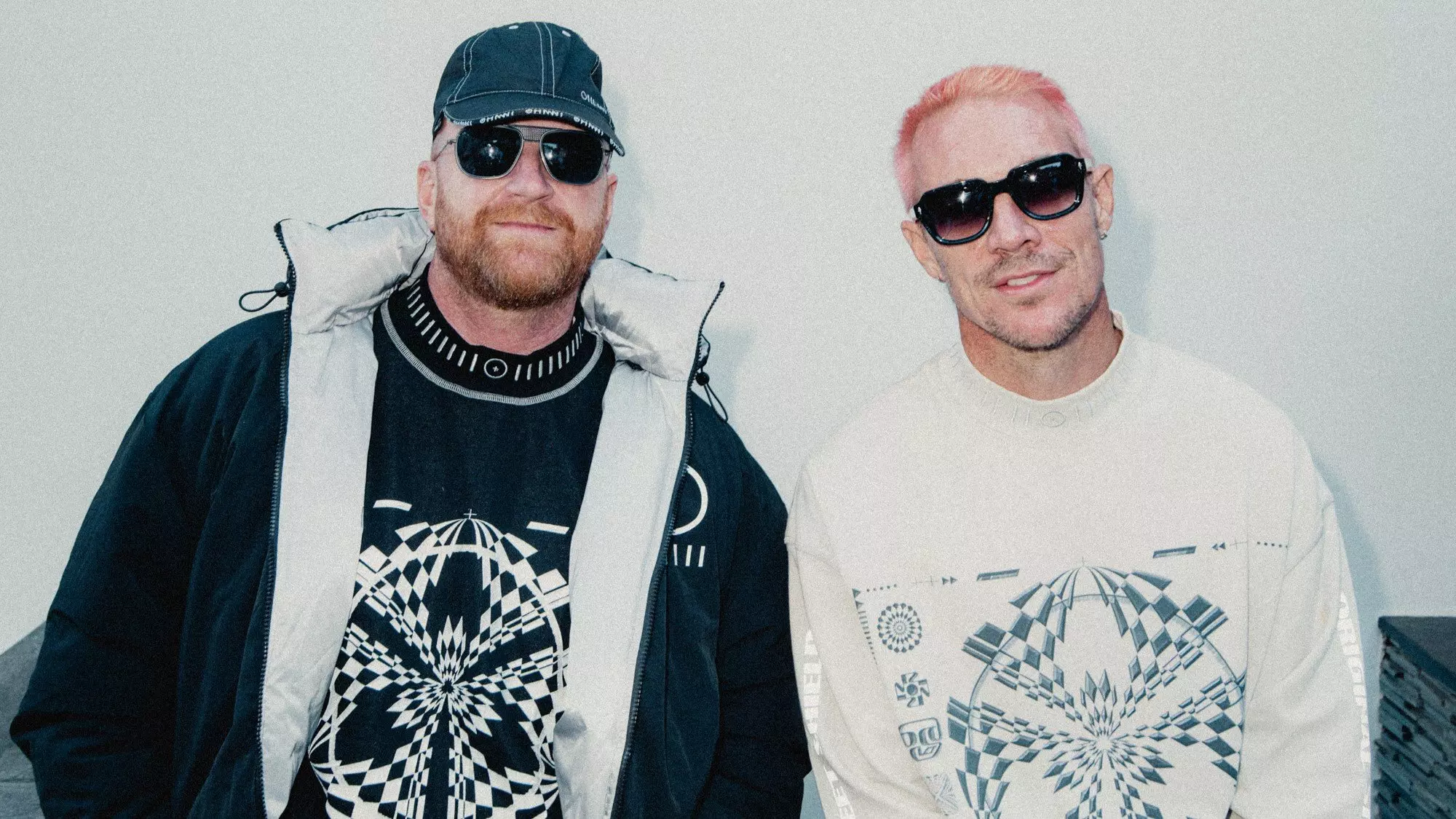
How Major Lazer's 'Guns Don't Kill People…Lazers Do' Brought Dancehall To The Global Dance Floor

YOASOBI Performs "Idol" | Global Spin
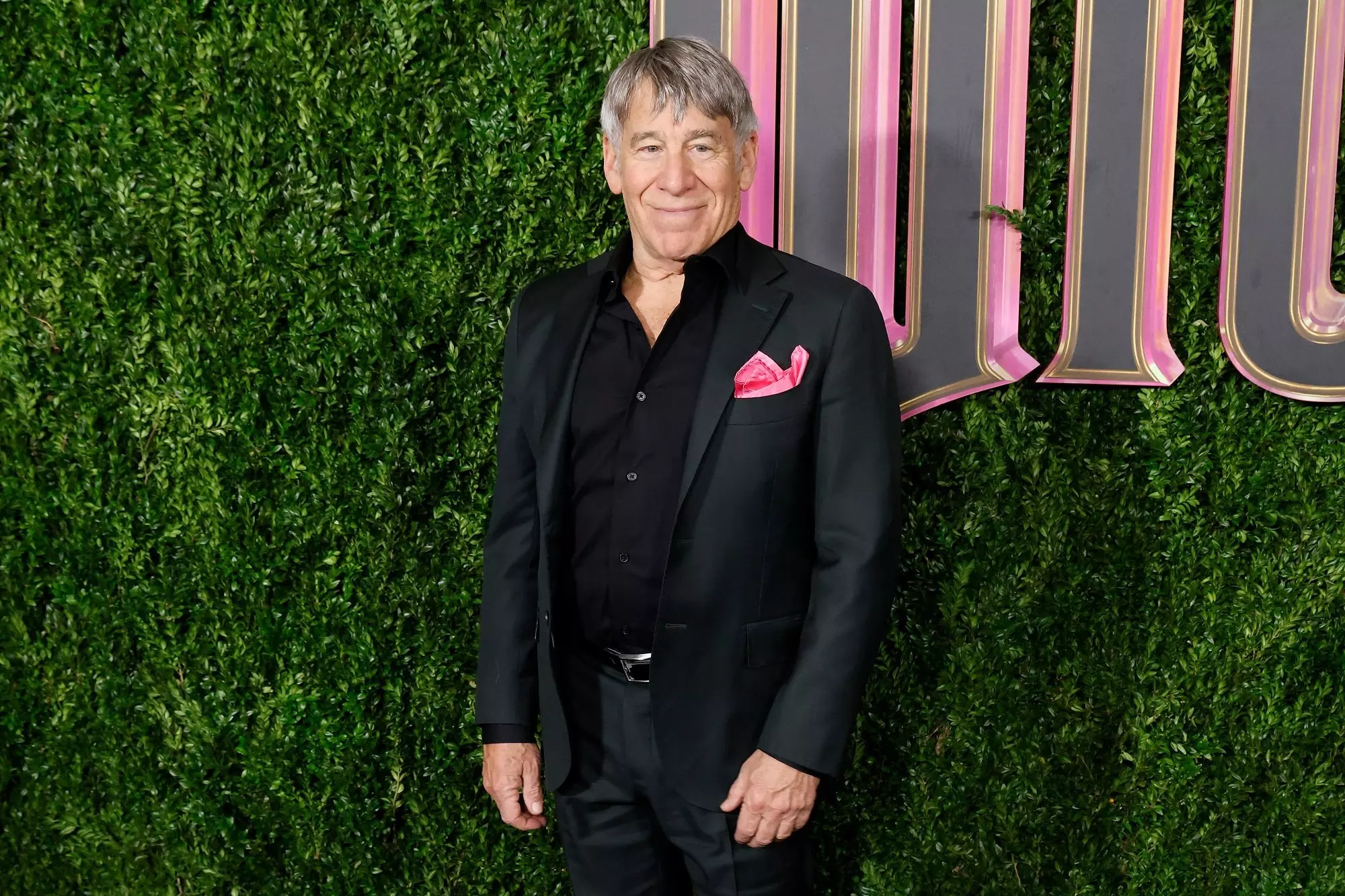
'Wicked' Composer Stephen Schwartz Details His Journey Down The Yellow Brick Road
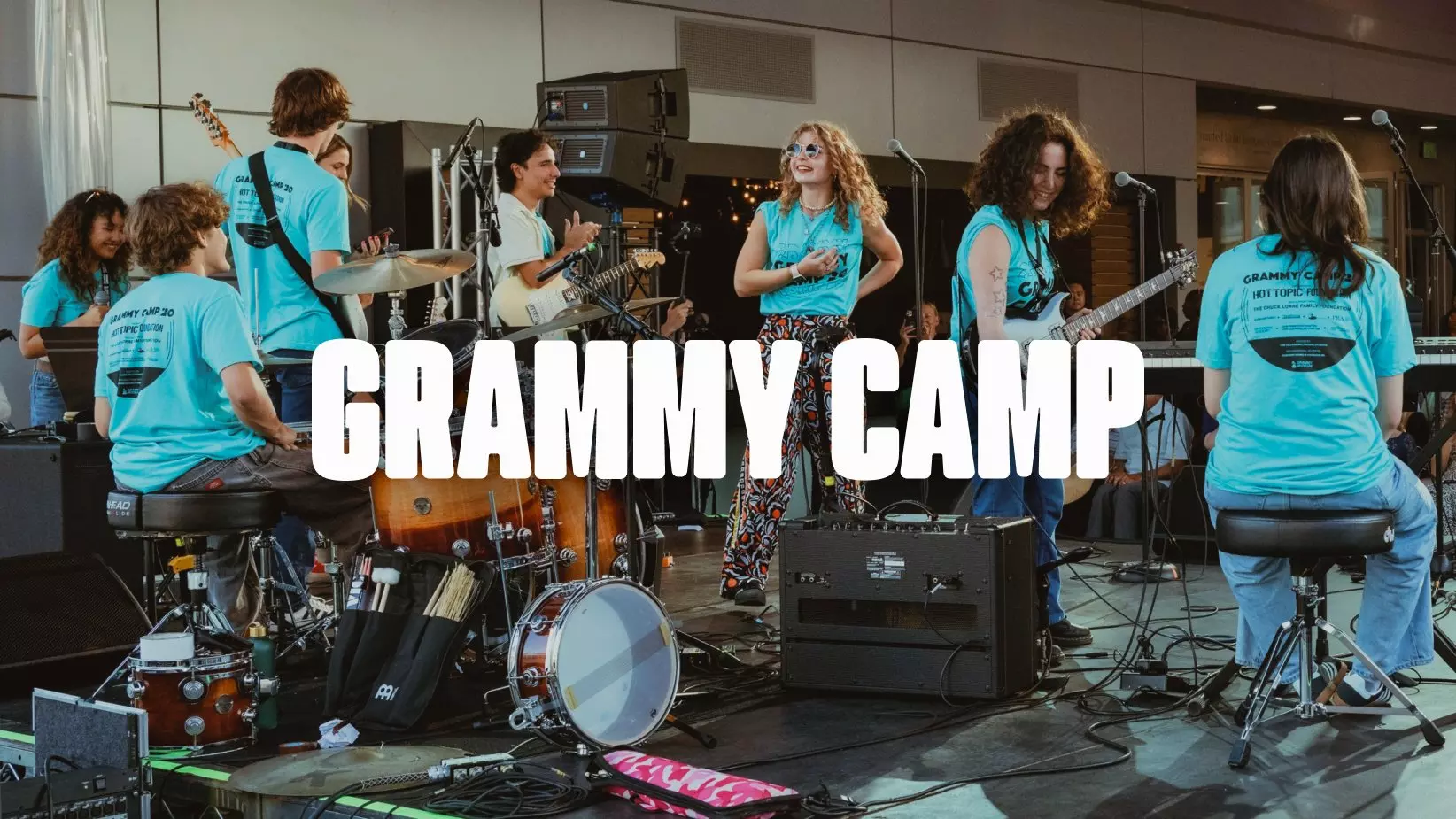
GRAMMY Museum Expands GRAMMY Camp To New York & Miami For Summer 2025
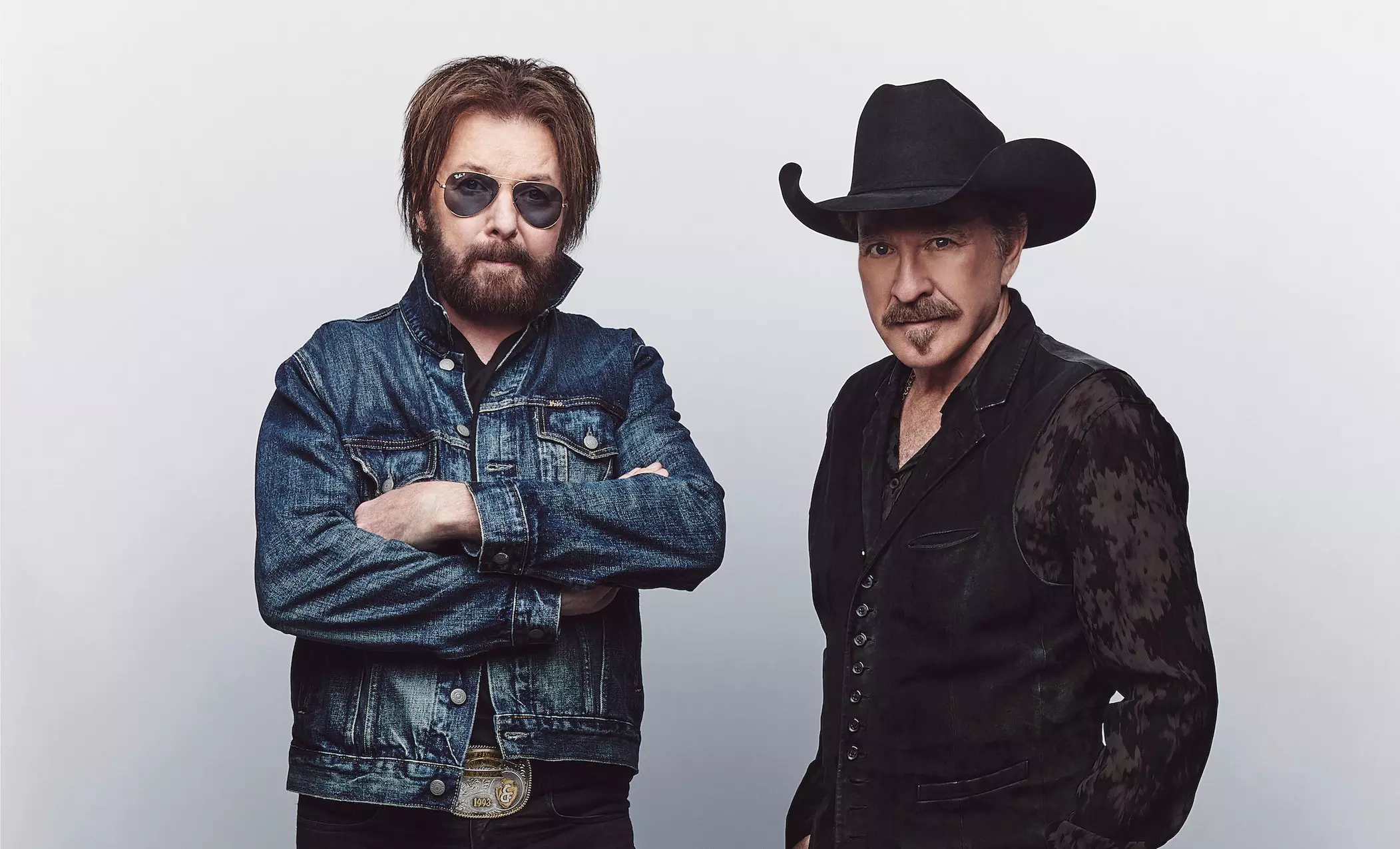
Living Legends: Brooks & Dunn On How 'Reboot II' Is A Continuation Of "Winging It From Day One"
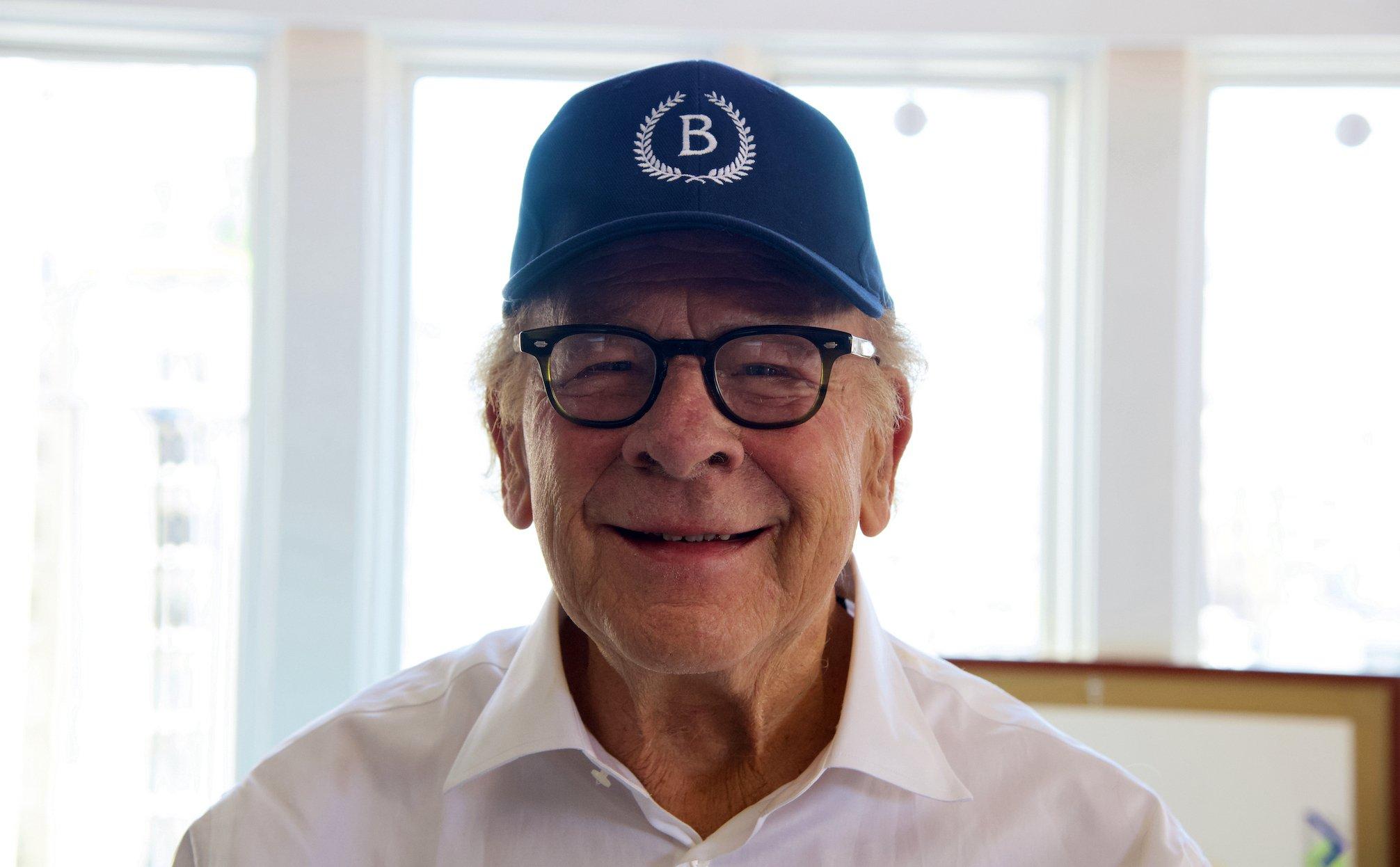
Photo: Stefan Falke
interview
Living Legends: Art Garfunkel On New Album 'Father And Son,' Following His Muse & "The Greatest Thrill Of My Performing Life"
As the folk veteran and his son Art Garfunkel Jr. release a cherished collection of covers, the Simon & Garfunkel singer looks back on his remarkable career — including his tearful latest reunion with Paul Simon.
At 83, Art Garfunkel has found a musical project that's perhaps even more exciting than a potential Simon & Garfunkel reunion: an album with his son.
The folk-rock icon and his 33-year-old singer/songwriter son, Art Garfunkel Jr., recorded a delicately layered album of their favorite standards from the past century. Titled Father and Son — fittingly, but also after the Cat Stevens anthem that is included in the collection — the album was produced by Art Jr. and opens with a striking, lush rendition of "Blue Moon." Among the other highlights are sensitive readings of the Beatles' "Blackbird," Cyndi Lauper's honey-dripping '80s ballad "Time After Time," and Eurythmics' majestic "Here Comes The Rain Again."
While the 12-song album is the duo's first full project together, it's not their first collaboration. A burgeoning star in Germany, Art Jr. has long taken after his father's legacy — even paying homage to Simon & Garfunkel's catalog with two full German projects — and the pair have recorded one-off duets and toured Germany together.
As a result, Art Sr. and Art Jr. (who cleverly refer to themselves as Garfunkel & Garfunkel) harmonize effortlessly on Father and Son. Their sympathetic combination of voices are reminiscent of the late '60s, when Garfunkel Sr. and his first musical partner, Paul Simon, became international superstars with their combination of folk roots and a vulnerable, poetic sheen.
Simon & Garfunkel still remains the pinnacle of Art Sr.'s musical output, but he's remained plenty busy since the beloved duo split in 1970. As a solo artist, Garfunkel was particularly prolific during the '70s, and has since released a total of 10 studio albums. Father and Son marks his first new album since 2007's Some Enchanted Evening (a dedication to the Great American Songbook), making the release all the more special for him and fans alike.
In celebration of his latest venture, Garfunkel Sr. spoke with GRAMMY.com about his musical chemistry with Art Jr., his emotional recent reunion with Paul Simon, and the place of transcendence that music occupies in his life.
My recurring thought as I listened to the new album was that you haven't lost the ability to be vulnerable through words and sound.
My wife says to me: you're in the youth of the eighties. You make being in that decade feel like another rebirth. I like that — the youth of the eighties.
Where are you right now?
I'm at the Hodges Bay Resort in Antigua. My wife brought me to the Caribbean with our son so that I could get stem cells. She's a big believer in them. I had my infusion yesterday, and now I'm kicking around, getting ready to fly home tomorrow.
How old were you when you realized that there was something magical about your voice?
I knew I had a voice when I was about 3 years old. It's my earliest memory. For me, singing is like breathing, something that comes naturally.
Did you know that you were breaking new ground when you recorded the first Simon & Garfunkel album in 1964?
You can't talk about this without thinking of Paul Simon, my partner. We came out of the folk period, as did Bob Dylan, and it evolved from folk into the pop world.
Was there a conscious attempt to be more intimate and poetic within the context of a pop album?
No, that was the nature of folk music — you put more teeth into what you were saying. The California hippies taught us to be more candid about our feelings, and we fell into that propensity.
You and Paul made five classic, unforgettable albums together. Am I being greedy if I wish that you had recorded a few more?
I met with Paul Simon three weeks ago in my New York studio. We hadn't seen each other in years — and suddenly, something about this meeting felt like a possibility. This has always been the case with Paul.
Paul's style was always, "let me show you what I've been working on lately." He would show me the new songs, and I'd go crazy over how good it was, because Paul Simon is a man of great talent. And my authentic response to his beautiful music made him very excited. That sincere appreciation led us to start working together. It's our style of being sociable.
This happened recently?
Three or four weeks ago. His ex-wife is moving into the place where I stay. I knew I was going to run into him sooner than later. We had dinner — there were hugs and tears. It's great when a man cries. But I felt that I really did hurt him in the past.
Your first reunion with Paul was incredibly moving — the Central Park concert in 1981, which spawned a double live LP and a video.
You're talking about the greatest thrill of my performing life. Nothing I've ever done quite matches the Central Park concert. I remember being on stage, turning to Paul and saying, "I knew we did something right in the '60s, but I didn't expect this." It was more than half a million people at the park, right near my home. When you watch the film, you can see we're both blissed out.
I feel history has been a bit unfair to the great solo albums that you made during the '70s.
In show business, you get a period of popularity, and it works like a wave. Often, it is a three-year run. You have your period of grace, and then the audience looks for something else. Even though the quality of what you're doing may be great, in the game of popularity you have your time — and then you don't.
Were you able to think about it at that time as philosophically as you do now?
You try not to think too much of commerce when you work. I sing because I've got to sing. I make albums simply because that's what I do. You try and divorce yourself from the popularity of what you're doing. If it's not going to catch on, it's not my fault. I still have my muse. I'm still going to sing and make new records.
I love your version of the classic Antonio Carlos Jobim bossa nova "Waters of March." That's a very tough song to get right, and you did.
[Sings] "A stick, a stone/It's the end of the road." Very different for me to do that. What album is it on? I don't want to put you on the spot...
It's on 1975's Breakaway. And what a great record that one is.
I always followed my muse. In all my solo albums, I went back and forth between producing them myself and then bringing an outside producer. Breakaway was a Richard Perry production, and I just followed his lead.
You injected the same sense of vulnerability that defines your music into the role of Sandy in the 1971 film Carnal Knowledge.
I had a whole acting career back then. [Director] Mike Nichols must have taken a shine to me when he asked Paul Simon to write a couple of songs for The Graduate. I have a wonderful memory of going to Hollywood. Mike arrived in his Bentley, picked us up at the Wilshire Hotel and brought us down to this giant soundstage where we matched our vocal of "Mrs. Robinson" to the screen. Later, he came by my house and handed me a script. We did Catch-22 together, and then Carnal Knowledge. He believed in me as an actor.
What was the best part of recording an album with your son?
I'm extremely proud of this record. We did "Let It Be Me" – it's an Everly Brothers song.
I love that you picked "Here Comes The Rain Again" by Eurythmics — the violins in the intro sound great.
I don't know what to say about it. It was Junior's choice — he wanted me to do it, and I did. He was the producer.
Was there a specific song that you insisted on performing together?
"Nature Boy." I'm crazy about "Nature Boy." And "Time After Time" by Cyndi Lauper. That's the first single on the album. I'm also doing a bunch of shows, by the way. I'm still singing at this advanced age, working the Carlyle Hotel in New York. Still carrying on.
Which Simon & Garfunkel album would you take to the proverbial desert island?
There's two that vie for first place. Bookends [from 1968] because the tracks flow together from song to song. "Overs" is the cynicism of middle age, followed by "Voices of Old People," and finally "Old Friends." The flow from birth to maturity and old age is a very interesting sequence for an album.
[1970's] Bridge Over Troubled Water, on the other hand, is just what I want — a bunch of tunes that are all lovely. I'm very proud of those songs.
And what would be the highlight of your solo career?
It's always good to say what flies into your mind before you think; your immediate gut reaction is usually the truth. And so I think of Breakaway, which has a very strategic use of echo. It's creamy. The notes are held for a long time. I like that.
Your life has included its inevitable share of sad moments. Has music helped you to keep things positive?
Music is a world unto itself. It stands apart from the rest of life and has an enormous power. I'm just pleased that it comes naturally to me, and that it is such a big part of my existence.
Latest News & Exclusive Videos

How Major Lazer's 'Guns Don't Kill People…Lazers Do' Brought Dancehall To The Global Dance Floor

YOASOBI Performs "Idol" | Global Spin

'Wicked' Composer Stephen Schwartz Details His Journey Down The Yellow Brick Road

GRAMMY Museum Expands GRAMMY Camp To New York & Miami For Summer 2025

Living Legends: Brooks & Dunn On How 'Reboot II' Is A Continuation Of "Winging It From Day One"




